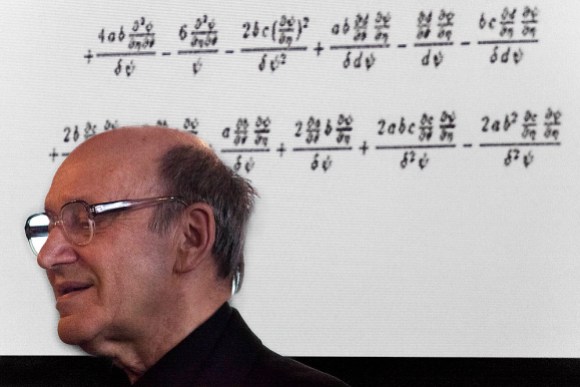
I believe I first heard of Michał Heller in 2008, when he won the Templeton Prize, but it was not until 2010 that I actually read one of his works. I became an avid follower of his work, from books to lectures uploaded online. Knowing this, in 2015 a friend asked me for a list of works to read before meeting with Heller.
This simple question led me down a Wikipedia rabbit hole. Today, Michal Heller’s article on the Polish Wikipedia stands at over 130,000 bytes of information, including words, code, and references. The page has nearly 1,200 total edits; I’ve contributed 870 of them, and helped get the page to “dobre artykuły,” a marker of high quality that is equivalent to the so-called “good” articles on the English Wikipedia.
See, shortly after the friend asked me that question, I started to wonder how many and which books Heller had actually written, and what fraction of it are the five or so that I had read at that time. There were lists on his homepage and on Polish Wikipedia, but they were both incomplete, outdated, purely chronological (not sorted by topic), and separately counted different editions of the same book. I had enough free time to improve that, and within weeks I posted a sorted list of about 60 books in around 130 editions, with the help of Tomasz Raburski, an administrator on the Polish Wikipedia. Later, I gathered some books from the list, and prepared a longer text on his philosophical and theological views.
After a couple of months, I realised that this work is far more than just entertainment. When Heller gave a public talk in November 2015, he was introduced as an author of more than 60 books. I wondered how the organizers counted that, so that I could compare their list to mine. Surprisingly, they used my list from Polish Wikipedia. They even printed the article and distributed it as a in introductory leaflet for the audience.
Another example of the article’s influence came in October 2016. Heller’s doctorate at Catholic University of Lublin was officially renewed 50 years after awarding it – their way of giving a honorary doctorate when someone has already received one academically. In the ceremony, his work was praised in a speech with structure and sentences that had been clearly inspired by the Wikipedia article. The fact that Wikipedia is used as a source not only by school and university students, but also by university rectors, is an evidence of its power and quality.
Today, the article has been much improved. I expanded the main text with input from Heller’s collaborators in March 2016, and professional photographs taken by Adam Walanus have been added. Much work, however, remains. The article lacks citations in places because I have not read a book references by a previous editor of the article, and I have only read less than half of Heller’s books (much less his hundreds of journal articles), contributing to a selection bias.
The largest problem I face is one of scope: even if the article gains a featured star one day (the highest marker of quality on many Wikipedias), I feel that it will not be enough to summarize his enormous levels of work. Wikipedia generally isn’t a place for an absolutely comprehensive list of an academic’s publications, interviews, talks, lectures, and more.

You could ask why I do all of this, especially given all of the time and work I have and have yet to put in—my career could benefit from pausing this work, for instance.
The answer is that because the world needs it. For one, philosophy is an often misunderstood field—and Heller’s work is less understood than most, as it branches into fields like theoretical physics. A Wikipedia article, written in summary style, is an accessible entry point for people looking to learn more about Heller and his views. Secondly, even faithful followers of his work are unfamiliar with his contributions to theoretical physics and cosmology. Thirdly, Heller is an excellent author in popular science, avoiding common mistakes of bestsellers – e.g. historical and philosophical misunderstandings, or over-sensational claims.
Perhaps even more importantly, however, is Heller’s usefulness in decoding the relationship between science and religion. A major and very public debate has been happening in places all around the world. Some people try to use scientific methods to prove the existence of a god, others try to do the opposite, some take the middle ground and say that the two are completely unrelated, and more.
I believe that these sorts of discussions need people like Heller, who – without pushing their own beliefs – can point to mistakes and misunderstanding made by one and copied by others. I personally don’t always agree with Heller; indeed, some of his work is probably not as good as it can or should be.
If all of Heller’s contributions were already well summarized somewhere on the Internet, whether Wikipedia or elsewhere, I might not read and write as much about it. But it is missing, and I see a need for it, so I persist.
Michał Tarnowski, Wikipedian

Can you help us translate this article?
In order for this article to reach as many people as possible we would like your help. Can you translate this article to get the message out?
Start translation